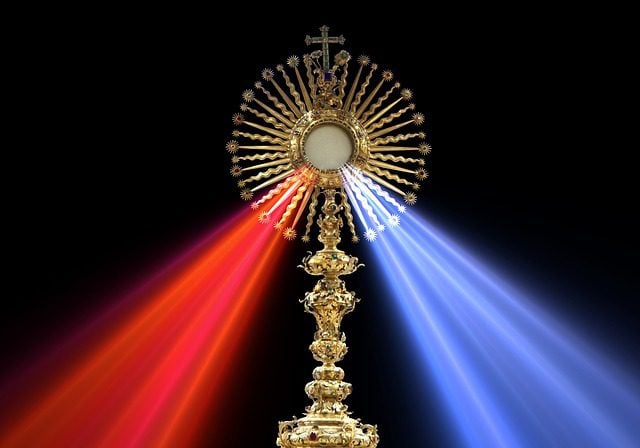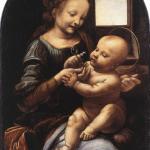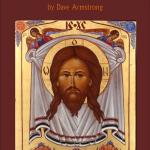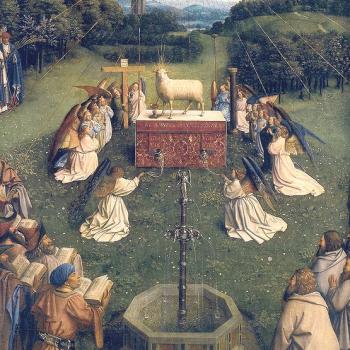
I received a remarkably critical letter (in the worst sense of that term), in response to my last column in The Michigan Catholic, entitled, “The Sunday Mass obligation makes perfect sense.” The woman more or less completely misunderstood my central point, which was not to say that we should attend Mass only out of some dead legalistic obligation (see my first paragraph and several other parts that denied that), but that the Mass obligation was a good thing for the sake of the spiritually weak or the newcomer. This woman wrote:
Every time I read your column in the MC, I feel a twinge of “uugh!” I felt the need to write and send. I know you have written books, but where is the heart of the matter? We don’t get power from going to church!! “which gives us all sort[s] of power and sustenance”. Where is that in the catechism? Jesus didn’t preach about power. He did not come in power. (see all references to Nativity for proof). . . .*You have the opportunity to teach people with real spiritual food, not baby paplum [sic]. Are you still basing your columns on 4th grade understanding like many newspapers do?
Luke 9:1 (RSV) And he called the twelve together and gave them power and authority over all demons and to cure diseases,*Luke 10:19 Behold, I have given you authority to tread upon serpents and scorpions, and over all the power of the enemy; and nothing shall hurt you.|*Luke 24:49 And behold, I send the promise of my Father upon you; but stay in the city, until you are clothed with power from on high.*John 1:12 But to all who received him, who believed in his name, he gave power to become children of God;*Acts 1:8 But you shall receive power when the Holy Spirit has come upon you; and you shall be my witnesses in Jerusalem and in all Judea and Sama’ria and to the end of the earth.*Acts 3:12 And when Peter saw it he addressed the people, “Men of Israel, why do you wonder at this, or why do you stare at us, as though by our own power or piety we had made him walk?*Romans 15:13 May the God of hope fill you with all joy and peace in believing, so that by the power of the Holy Spirit you may abound in hope.*1 Corinthians 5:4 . . . When you are assembled, and my spirit is present, with the power of our Lord Jesus,*Ephesians 1:19 and what is the immeasurable greatness of his power in us who believe, according to the working of his great might*Ephesians 3:20 Now to him who by the power at work within us is able to do far more abundantly than all that we ask or think,*Colossians 1:11 May you be strengthened with all power, according to his glorious might, for all endurance and patience with joy,*2 Timothy 1:7-8 for God did not give us a spirit of timidity but a spirit of power and love and self-control. [8] Do not be ashamed then of testifying to our Lord, nor of me his prisoner, but share in suffering for the gospel in the power of God,*1 Peter 1:5 who by God’s power are guarded through faith for a salvation ready to be revealed in the last time.*[see many more such passages]
Christ’s work in the liturgy is sacramental: because his mystery of salvation is made present there by the power of his Holy Spirit; because his Body, which is the Church, is like a sacrament (sign and instrument) in which the Holy Spirit dispenses the mystery of salvation; and because through her liturgical actions the pilgrim Church already participates, as by a foretaste, in the heavenly liturgy.
We must therefore consider the Eucharist as:
– thanksgiving and praise to the Father;
– the sacrificial memorial of Christ and his Body;
– the presence of Christ by the power of his word and of his Spirit.
The Eucharist is our daily bread. The power belonging to this divine food makes it a bond of union. Its effect is then understood as unity, so that, gathered into his Body and made members of him, we may become what we receive.
In addition to the Anointing of the Sick, the Church offers those who are about to leave this life the Eucharist as viaticum. Communion in the body and blood of Christ, received at this moment of “passing over” to the Father, has a particular significance and importance. It is the seed of eternal life and the power of resurrection, according to the words of the Lord: “He who eats my flesh and drinks my blood has eternal life, and I will raise him up at the last day.” The sacrament of Christ once dead and now risen, the Eucharist is here the sacrament of passing over from death to life, from this world to the Father.
. . . [he wanted] to leave to his beloved spouse the Church a visible sacrifice (as the nature of man demands) by which the bloody sacrifice which he was to accomplish once for all on the cross would be re-presented, its memory perpetuated until the end of the world, and its salutary power be applied to the forgiveness of the sins we daily commit.
The Most Holy Trinity gives the baptized sanctifying grace, the grace of justification:
– enabling them to believe in God, to hope in him, and to love him through the theological virtues;
– giving them the power to live and act under the prompting of the Holy Spirit through the gifts of the Holy Spirit;
– allowing them to grow in goodness through the moral virtues.
Thus the whole organism of the Christian’s supernatural life has its roots in Baptism.
May God bless you abundantly,
Dave Armstrong












